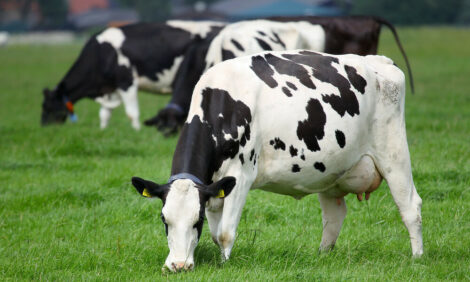



UK Milk Production at Lowest Level since 1970's
UK - The alarming news that milk production in the UK is at its lowest point since the early 1970’s must serve as an immediate wake up call to consumers, milk processors and retailers that serious problems exist in the UK dairy industry according to NFU Scotland.Milk production in the UK has now fallen for five consecutive years. DairyCo, the dairy farmer-funded levy body has said in its latest newsletter that UK milk deliveries for the past 12 months will be around 12,750 million litres. This would be the lowest annual milk production figure for more than 35 years and would leave the UK around 12 percent below its EU-allocated quota.
The Union has serious concerns that the recent cuts in the prices paid to farmers for their milk, which started in January, will have further dented dairy farmer confidence.
NFU Scotland President, Jim McLaren said: “While we would want to see a British dairy industry that was thriving and moving forward with confidence, the year-on year declines in the amount of milk being produced are a clear signal that the dairy chain is still not working for dairy farmers in the way that it should. If the decline in production is to be halted and reversed, then it needs milk purchasers and their supermarkets customers to start paying a milk price that allows hard working dairy farmers to see a future in the industry.
“For those consumers who buy from a widening range of British dairy products – be it fresh milk, cheese, butter, yoghurts or desserts – there may be little awareness of the decline taking place at farm level. Shop shelves remain filled but, against this backdrop of falling production, can home produced dairy products be guaranteed in the future?
“Much good work has been done. The success story is that the amount of milk going into the premium markets of fresh liquid milk and mature cheddar is growing and has never been higher. By comparison, the volume of British milk going into to low value products such as milk powder and butter and, therefore, exposed to poorer world commodity prices is falling.
“Given the growing sales of fresh milk and quality cheddar, we need to identify who is making the most of these healthy markets. The continuing fall in production will tell you that, despite the UK having the most efficient dairy farmers in Europe, they are seeing little of this benefit. Profitability at the farm gate, and therefore the confidence to produce more milk, remains low. A DairyCo report into who is currently making money out of the dairy supply chain is due out in the coming weeks. We will read its conclusions with interest and hope that all with a vested interest in milk production will do likewise.”
“Dairy UK, the organisation primarily representing milk processors, has in recent weeks suggested that dairy farmers are too negative about the future. While we agree that long term prospects for dairying are broadly positive, the reality is that the job of milking cows, day-in and day-out, needs genuine reassurances here and now. Milk processors, and their representative body, have a key role in pulling the UK out of its current downward production spiral. They can start by demanding, in unequivocal terms, that supermarket customers pay their members a fair price for the milk and dairy products that they provide which would allow them, in turn, to improve the prices paid to farmers. Dairy UK has made representation to the major retailers in the past and it should consider doing so again now.
“Providing a clear signal to farmers that their milk is wanted and that a fair price will be paid will see all parts of the chain act in a responsible manner to halt the slide in UK milk production. Without a long term plan that sees farmers get a fair reward for their efforts, delivered over a sustained period of time, then UK milk production could continue to slide down the drain.”
TheCattleSite News Desk


